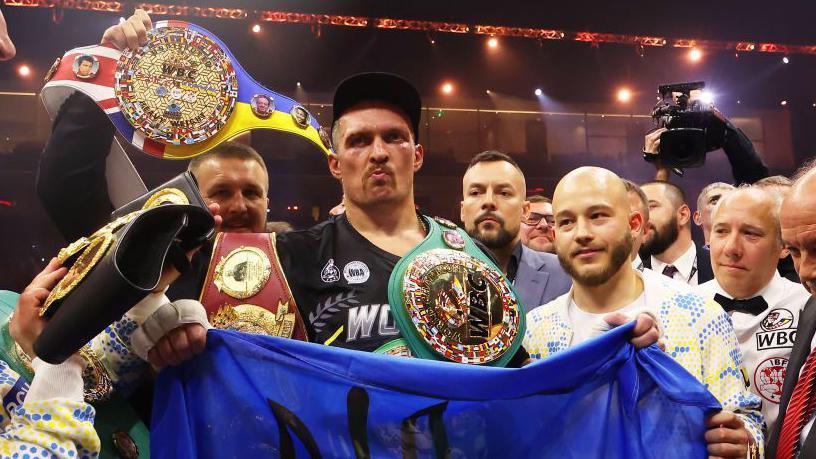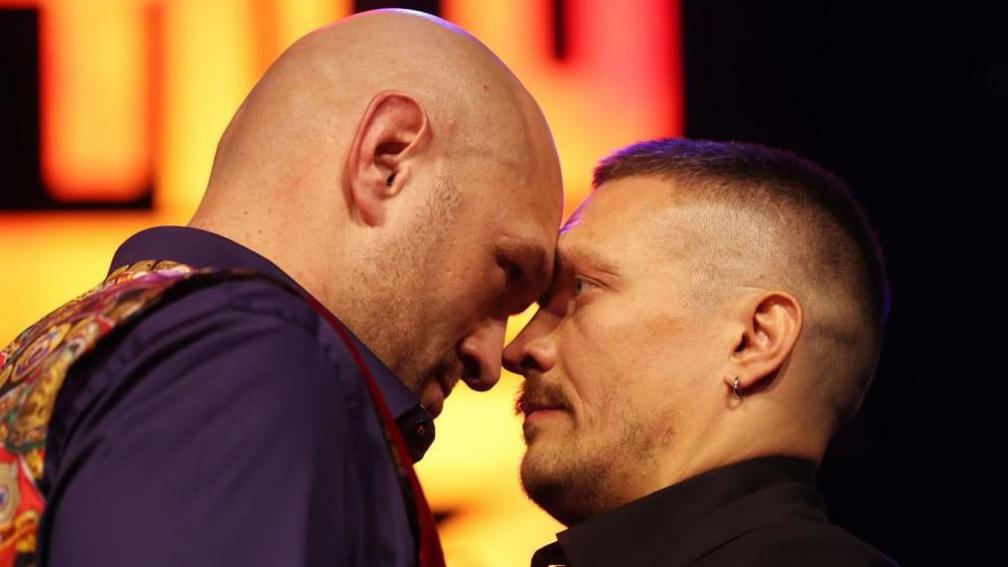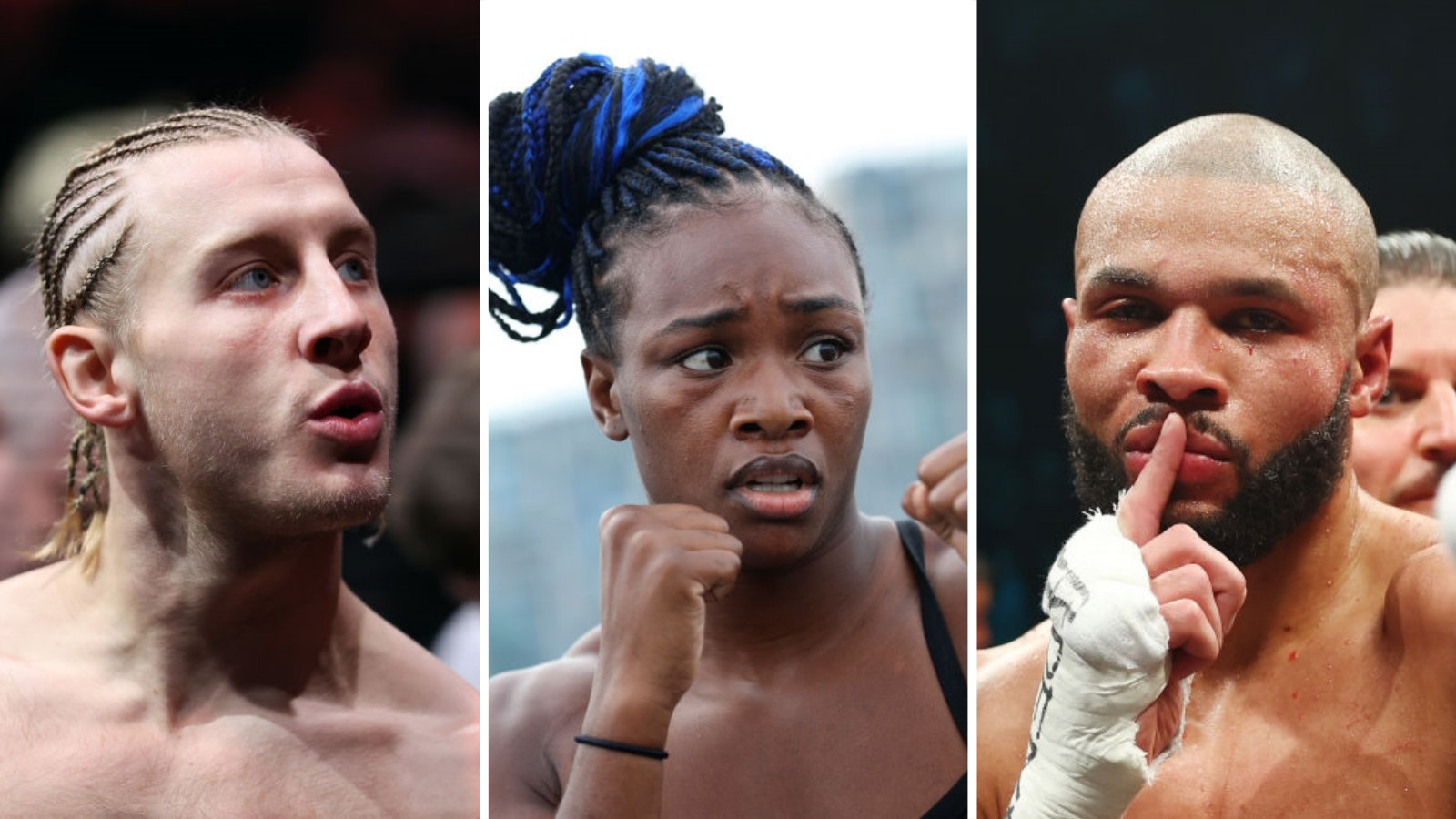IBF v Usyk - power struggle brewing in boxing

Oleksandr Usyk is the first WBO, WBA, IBF and WBC heavyweight champion
- Published
We’ve waited almost 25 years for an undisputed heavyweight champion. Oleksandr Usyk rose to the top and now the IBF wants to strip him of his belt.
Why strip the man who’s got all those belts? Seems ridiculous, surely?
It all comes down to the IBF and its mandatory challenger. The IBF, according to its rules, has to strip Usyk if he doesn’t fight their mandatory challenger next. That man is Daniel Dubois.
Really there is no other option, as ridiculous as it sounds.
The idea of a mandatory was a lovely idea – in 1956 when there was only one sanctioning body.
But as soon as you get more than one recognised sanctioning body, we now have four - and more than one champion - the mandatories are instantly diluted.
The IBF has history in this department and this is not the first time it has backed itself into a corner.
How else do you explain Czar Glazkov being the number one contender back in 2015?
When Tyson Fury become unified champion in November 2015, the very next morning his manager and promoter, Mick Hennessy, was fielding phone calls over his scrambled eggs trying to keep the IBF belt.
It was probably 1am in New Jersey where the IBF is based, Tyson wasn’t even down for breakfast yet.
The IBF stripped Fury just over a week later. Within 50 days, they had arranged an alternative world title fight between their mandatory Glazkov and American Charles Martin.
But the IBF v Usyk is much more than a singular disagreement. This is boxing v the sanctioning bodies. And the power struggle has already started.
We have to remember one single thing, because this is what makes boxing unique from all other sports, the way we ‘rank’ our fighters isn’t done in a boxing ring.
It is, and always has been since the early 1960s, a kind of horse trading.
A group of people show up at a five-star hotel somewhere, at one of the sanctioning bodies’ annual conventions, they sit out on the veranda drinking cocktails and they trade. Every fighter ranked in the WBC, WBA, WBO and IBF’s rankings pays sanctioning fees.
If you write down the last 10 heavyweight champions, don’t imagine that any of the ‘mandatory challengers’ have been through a long, gruelling process to get to that position.
Sanctioning bodies are a business. They want to make a profit and it has been a lean period for them.
Over 60 years, 2023 was only the second year when there was only one heavyweight world title fight. That’s a bad time for the sanctioning bodies.
They’ll make more money in the short-term by sanctioning Dubois v Anthony Joshua in September, rather than being forced to wait until December for Usyk’s rematch against Fury.
Rival boxing promoters Frank Warren and Eddie Hearn
Is a breakaway league in boxing possible?
Does Dubois-Joshua need the IBF title? Absolutely not. It’s a terrific fight. Dubois-Joshua would sell out Wembley if it was for nothing more than a made up ‘champion of Wembley’ belt.
But this is the war brewing in boxing. The sanctioning bodies are massively against any move to diminish their role and power.
The state of heavyweight boxing of the last 18 months is a threat to them.
What’s being put forward by the powerbrokers in Saudi Arabia makes more sense.
The big fights happen regularly. The fights we couldn’t imagine happening have been happening, and are still happening.
That will worry the sanctioning bodies. When Joshua and Deontay Wilder held all the titles between them, the sanctioning bodies had more than three years to get them in the ring together.
You’ve got one job - get Mr A in the ring with Mr B and you have three years to do it. They didn’t do it.
If you relate that to any other job in the world, you’d be sacked for that, wouldn’t you?
We’ve not had any confirmation this reported boxing league is happening. It’s speculation at the moment, but it is something that makes sense if it can be done.
On paper it’s a great idea. Get the 15 best heavyweights or welterweights in a league to box each other regularly.
The sanctioning bodies do not fit into a league, they can’t. And that’s why there is a great behind-the-scenes battle going on.
Wouldn’t it be great if we didn’t have to put up with these men and women in their fancy suits flying in for every fight week, to get into the ring and fight each other to get their belt around the champion’s waist first?
If they were removed from the squabble, what could be achieved?
If we had a situation in five years' time where we had had two or three years of boxers fighting in a league, would any boxing fan be grieving the days of the IBF?
I think the sanctioning bodies are only too aware that they are not secure, like they once were.
They realise they’re in jeopardy of overplaying their hand. The best thing they can do is join forces. If the four sanctioning bodies can bury their egos, sit around that cocktail table and come up with their own league, then that becomes interesting.
The sanctioning bodies have had more than 60 years of ridiculous control and power.
But any breakaway, any league, it can’t be one promoter. Boxing needs a united front.
Related topics
- Published17 December 2024

- Published28 April 2024

